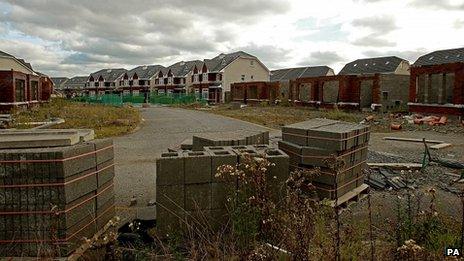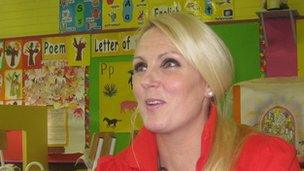Could the Irish Republic's bailout blues be lifting?
- Published

Unfinished housing estates become a symbol of the collapse in the Irish Republic's property market
By any measure, November 2010 was a bad month for the Republic of Ireland.
Besieged by the financial markets, the government spent weeks denying that the country needed a bailout, before an about turn that saw them welcoming inspectors from the International Monetary Fund to Dublin to work out a package of support.
But one year on from that tumultuous month, the Irish Republic seems to have started to recover from the indignity and financial cost of those events.
While last November protesters barged their way through the gates of the main government buildings as the bailout moved closer, today security guards seem almost bored by the tranquillity of a cold Dublin morning.
Exports and growth
Ireland's month as the centre of the financial storm soon passed, allowing its fellow bailed-out nations Portugal and Greece to dominate the headlines.
The people returned a damning verdict on the Fianna Fail government, dispatching them at the general election in February and handing a landslide win to a coalition led by the new Taoiseach, Enda Kenny.
Month after month of depressing economic news followed, but recently the country has got more used to stories containing old concepts like 'success' and 'growth'.
Exports grew 5.5% in the first six months of 2011 as businesses took advantage of their new-found competitiveness.
This helped contribute to overall economic growth in the first half of the year - the first time the country had seen two quarters of growth since 2007.
Irish pepperoni

Dawn Farm Foods has seen exports rise in recent months
A room full of drying salami might seem like an unlikely symbol of economic renewal, but for Ireland's resurgent export industry it represents just that.
Dawn Farm foods in Naas exports sliced meat to some of Europe's biggest pizza chains, food manufacturers and supermarkets.
The company's factory is working at almost full capacity with workers busy loading trays with huge chorizo and pepperoni sausages.
The firm was forced to lay some employees off during the worst of the downturn and has frozen pay for the past three years.
But it has seen exports to the UK and the eurozone rise over the past few months, and is cashing in on demand from emerging economies as consumers develop an ever-increasing taste for high quality meat.
For the company's chief executive, Larry Murrin, it all bodes well for the Republic's aim of driving an export-led recovery.
"Pharmaceuticals, IT and food are all proving to be very successful exports for the country," he says.
"The more exports we have, the more that will help the country's coffers, which will ultimately help to deal with the position that we're in."
Social media
Dublin's redeveloped Docklands area was one of the landmark projects of the Celtic Tiger boom.
Residential flats were interspersed with retail outlets and a huge new theatre was erected, surrounded by shiny glass office blocks.
Unlike many of the building projects of the boom, it seems that the Docklands area might be justifying the developer's lofty ambitions.
Google is currently finishing off its new European headquarters for its 2,200 employees, joining fellow technology firms Facebook and Linkedin. Twitter is due to move there in the next year.
The companies are attracted by the Republic's low corporation tax rate of 12.5% - a policy that has been criticised by the country's eurozone neighbours, but stubbornly retained by the Irish government.
For while much of the companies' profits are repatriated, the government insists that the benefits to employment and the emergence of local software companies justify the low tax rate.
Ghost estates
But while the offices and apartments of central Dublin are gradually recovering their lustre, huge parts of the housing market are still stuck in reverse.
On a housing estate north of the capital, the problems facing the property industry are plain to see.

House prices on the Castlemoyne estate have fallen by more than a half
In 2005, the Castlemoyne development was marketed as a state-of-the-art and spacious family-friendly estate, especially convenient for Dublin workers.
Walking through the estate in the cold reality of the post-boom Irish Republic, it becomes clear why house prices have fallen more than 50% - and are still in decline.
The homes look perfect from the outside, with neat hedges and perfectly trimmed lawns, but very few of them have ever been lived in and the prices have almost halved.
While parts of Irish industry are beginning to revive, the weight of toxic property debt is still acting as a dead weight on the country's banks, meaning that mortgage lending has almost ground to a halt.
Falling wages, rising taxes
Across Europe, the last year has seen populations being forcibly acquainted with their own local version of austerity.
For the Irish population, cut backs, wage reductions and tax increases have become a way of life since 2008.
The government has made cuts totalling 21bn euros ($28bn; £18bn) in the past six years, representing over 13% of the country's economic output.
There have been 325,000 job losses across the economy and public sector workers have seen their pay fall by 14% on average.
And with the country preparing for another round of budget cuts on 6 December, people are beginning to suggest that the country is suffering from austerity fatigue.
Patience wearing thin
Niamh Dodrill is one of the thousands of public sector workers who have borne the brunt of many of the spending cuts and tax rises.

Niamh Dodrill has seen her disposable income slashed and is getting tired of austerity cuts
She has had her pay cut, her pension terms reduced and is now worried that she might join the 37,500 public sector workers who have lost their jobs since the start of the cutbacks.
Sitting in her classroom in one of the most deprived parts of central Dublin, it is clear that her patience with austerity is wearing thin.
"They keep hitting the same people - the middle classes - time after time, while the bankers seem to get away with everything," she says.
"My husband and I are both teachers and we've seen our disposable income cut to nothing - I can't see how we're going to manage Christmas this year."
Austerity fatigue
Despite a growing feeling that people have taken as much austerity as they can, the last year has been conspicuous by the absence of riots and demonstrations on the streets of Dublin.
Teachers and students have voiced their anger at government cuts by taking to the streets but, unlike Greece and Portugal, the country has not been brought to a standstill by strikes and protests.
Some have put it down to the Irish population's long history of economic endurance; others say that people are more happy to accept the austerity having enjoyed the benefits of the boom.
Sitting in the imposing Edwardian building of the finance ministry is Michael Noonan, the minister in charge of imposing yet more austerity on the Irish people in the coming weeks.
"People are very educated and aware of what needs to be done, but of course that does not make it any less burdensome when it actually has to happen," he says.
"We must always remember that one person's fiscal correction is another person's public service - so are conscious of the need to maintain social cohesion.
"We must maintain the support of the people and build up the confidence of the people."
Nervous markets
For a country that has had six different austerity packages and another one to come, it has remained resilient despite the tide of bad news.
With the recovery still at a very early stage, there is nervousness that, despite all the pain, the Irish Republic could be knocked off course by the world economy.
For a country where exports represent 100% of annual economic output, the eurozone crisis and economic stasis in the US represents a big danger to the recovery.
The Celtic Tiger has been well and truly beaten up by the world financial crisis and it could be a while before it stirs again.
- Published14 October 2011
- Published22 September 2011
- Published19 September 2011